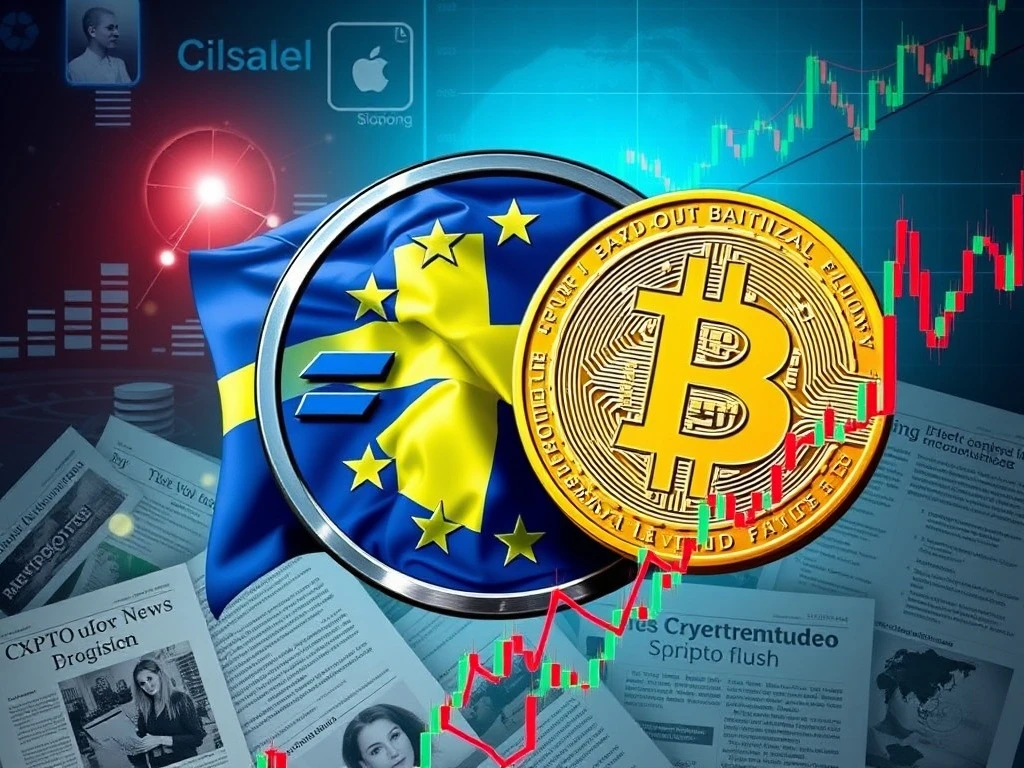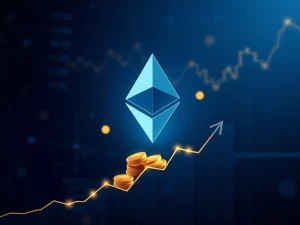Urgent Crypto Market News: ECB Advances Digital Euro, Sweden Eyes Bitcoin Reserve Amid XPL Token Turmoil

The cryptocurrency world constantly evolves, bringing significant developments daily. For enthusiasts and investors alike, staying updated is crucial. Today’s Crypto Market News highlights several pivotal events shaping the digital asset landscape. The European Central Bank has made strides with its digital euro project. Simultaneously, a prominent altcoin faced severe volatility, sparking insider trading allegations. Moreover, a European nation is now exploring a strategic Bitcoin reserve. These stories underscore the dynamic nature of blockchain technology and its growing influence on global finance.
European Central Bank Progresses with Digital Euro Development
The European Central Bank (ECB) is advancing its preparations for a potential Digital Euro launch. The ECB announced framework agreements with technology providers. These partners will develop key components for the central bank digital currency (CBDC). This marks a significant step in the project’s preparation phase.
On Thursday, the ECB confirmed agreements with seven entities. An eighth partner is expected soon. These providers will offer services vital to the digital euro’s infrastructure. Key areas include managing fraud and risk, ensuring secure payment information exchange, and developing necessary software. For example, Feedzai, an AI company, will detect fraud. Giesecke+Devrient, a security technology firm, will also contribute.
Dr. Ralf Wintergergerst, CEO of Giesecke+Devrient, commented on the collaboration. “G+D and other successful tenderers will work with the ECB,” he stated. This work involves finalizing planning and timelines. The goal is to design, integrate, and develop the Digital Euro Service Platform. This initiative aligns with the ECB Governing Council’s guidance and EU legislation.
Furthermore, these technology companies will provide crucial components like “alias lookup.” This feature allows digital euro users to send or receive funds easily. They won’t need to know the recipient’s Payment Service Provider details. Giesecke+Devrient also holds responsibility for developing offline payment capabilities. This means users could make or receive digital euro payments even without internet access, enhancing accessibility.
Plasma Founder Addresses Plasma XPL Token Plunge
The native token of the Plasma project, XPL, experienced a dramatic price drop recently. Its value plummeted by over 50% during the weekend. Consequently, founder Paul Faecks has denied accusations of insider selling. The community widely speculated about team members offloading tokens into the market.
Faecks firmly rejected these claims on Thursday. He emphasized that investor and team allocations remain locked. These allocations have a three-year lock-up period, including a one-year cliff. “No team members have sold any XPL,” Faecks asserted. Plasma officially launched its mainnet beta and the Plasma (XPL) token on September 25. This layer-1 blockchain aims to make stablecoin payments cheaper and faster.
Following its launch, XPL’s price initially spiked. It reached almost $1.70 on Sunday. However, it then steadily declined to $0.83 by Wednesday. This sharp drop erased more than half of its value, according to TradingView data. The significant price movement raised concerns among community members.
Many suspected the team might have engaged in time-weighted average price (TWAP) selling. This algorithmic strategy involves breaking down a large sell order. It splits it into smaller, equally sized orders. These orders are then executed at regular time intervals. Such a strategy can mask large sell-offs. Community members quickly initiated on-chain analysis to investigate XPL’s token flows. Independent sleuth ManaMoon highlighted movements from the Plasma team vault. The community member noted that the wallet sent over 600 million XPL tokens to exchanges. These transfers occurred in the days leading up to the mainnet launch, fueling further speculation.
Sweden Explores National Bitcoin Reserve Amid Digital Arms Race
Two members of Sweden’s parliament, the Riksdag, have proposed a significant financial move. They suggest the country investigate establishing a strategic Bitcoin Reserve. This initiative aims to combat inflation and diversify national holdings. Swedish Democrats Dennis Dioukarev and David Perez presented their proposal on Wednesday.
They argue that Sweden should join the “digital arms race.” Many other countries, including the US, are already considering similar reserves. Dioukarev and Perez believe Sweden should “participate in this digital arms race.” They advocate for joining the growing group of nations recognizing Bitcoin’s potential. This proposal highlights Bitcoin’s increasing acceptance as a strategic asset.
Similar to the US, the Swedish lawmakers floated an idea for funding the reserve. They suggested using seized Bitcoin. However, the decision on which authority will manage the Bitcoin (BTC) remains an “open question” for now. This initiative reflects a broader global trend. Nations are exploring digital assets as a hedge against economic instability. They also seek to maintain competitiveness in the evolving financial landscape.
The proposal signifies a growing governmental interest in cryptocurrencies beyond mere regulation. It underscores a shift towards potentially integrating digital assets into national financial strategies. This development will likely spark further debate within Sweden’s political and financial sectors. It also sets a precedent for other nations considering similar moves.
Broader Implications for the Crypto Market News
These developments collectively paint a vivid picture of the current Crypto Market News. The ECB’s progress on the Digital Euro shows central banks’ commitment to digital currencies. This move could reshape traditional finance. The Plasma XPL token’s volatility reminds investors of altcoin market risks. It also underscores the importance of transparent tokenomics. Meanwhile, Sweden’s Bitcoin reserve proposal signifies a growing sovereign interest in decentralized assets. These events highlight the ongoing convergence of traditional finance, government policy, and decentralized technology. Investors and enthusiasts should monitor these trends closely. They indicate significant shifts in the global financial ecosystem.









